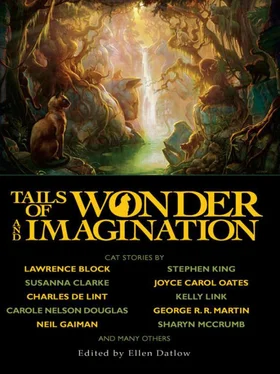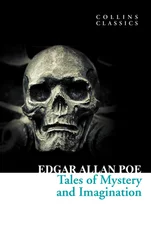Ellen Datlow - Tails of Wonder and Imagination
Здесь есть возможность читать онлайн «Ellen Datlow - Tails of Wonder and Imagination» весь текст электронной книги совершенно бесплатно (целиком полную версию без сокращений). В некоторых случаях можно слушать аудио, скачать через торрент в формате fb2 и присутствует краткое содержание. Год выпуска: 2010, ISBN: 2010, Издательство: Night Shade Books, Жанр: Фэнтези, Фантастика и фэнтези, Ужасы и Мистика, на английском языке. Описание произведения, (предисловие) а так же отзывы посетителей доступны на портале библиотеки ЛибКат.
- Название:Tails of Wonder and Imagination
- Автор:
- Издательство:Night Shade Books
- Жанр:
- Год:2010
- ISBN:978-1-59780-170-6
- Рейтинг книги:5 / 5. Голосов: 1
-
Избранное:Добавить в избранное
- Отзывы:
-
Ваша оценка:
- 100
- 1
- 2
- 3
- 4
- 5
Tails of Wonder and Imagination: краткое содержание, описание и аннотация
Предлагаем к чтению аннотацию, описание, краткое содержание или предисловие (зависит от того, что написал сам автор книги «Tails of Wonder and Imagination»). Если вы не нашли необходимую информацию о книге — напишите в комментариях, мы постараемся отыскать её.
collects the best of the last thirty years of science fiction and fantasy stories about cats from an all-star list of contributors.
Tails of Wonder and Imagination — читать онлайн бесплатно полную книгу (весь текст) целиком
Ниже представлен текст книги, разбитый по страницам. Система сохранения места последней прочитанной страницы, позволяет с удобством читать онлайн бесплатно книгу «Tails of Wonder and Imagination», без необходимости каждый раз заново искать на чём Вы остановились. Поставьте закладку, и сможете в любой момент перейти на страницу, на которой закончили чтение.
Интервал:
Закладка:
“…haven’t eaten a mud-pot in, oh, two, three…”
“…can’t be the man who is supposed to save…”
“…insane, why just look at…”
“…what is that thing in his pocket? Look at it! My God, it moved! It’s alive, I tell you, I saw it…”
“Silence!” Lysan’s voice was like a knife cutting through the hubbub. The room quieted as, one by one, the Lords Guardian turned toward him. “We have come together at your beck and call,” Lysan said acidly to Tuf. “We expected you to bring us an answer. Instead you appear to have brought us dinner.”
Someone snickered.
Haviland Tuf frowned down at his muddy hands, and wiped them primly on his greatcoat. Taking Dax from his pocket, Tuf deposited the lethargic black kitten on the table. Dax yawned and stretched, and ambled toward the nearest of the Lords Guardian, who stared in horror and hurriedly inched her chair back a bit. Shrugging out of his wet, muddy greatcoat, Tuf looked about for a place to put it, and finally hung it from the laser rifle of one of his escort. Only then did he turn back to the Lords Guardian. “Esteemed Lords Guardian,” he said, “this is not dinner you see before you. In that very attitude lies the root of all your problems. This is the ambassador of the race that shares Namor with you, whose name, regrettably, is far beyond my small capabilities. His people will take it quite badly if you eat him.”
Eventually someone brought Lysan a gavel, and he rapped it long and loud enough to attract everyone’s attention, and the furor slowly ebbed away. Haviland Tuf had stood impassively through all of it, his face without expression, his arms folded against his chest. Only when silence was restored did he say, “perhaps I should explain.”
“You are mad,” Lord Guardian Harvan said, looking from Tuf to the mud-pot and back again. “Utterly mad.”
Haviland Tuf scooped up Dax from the table, cradled him in one arm, and began to pet him. “Even in our moment of victory, we are mocked and insulted,” he said to the kitten.
“Tuf,” said Lysan from the head of the long table, “what you suggest is impossible. We have explored Namor quite sufficiently in the century we have been here so as to be certain that no sentient races dwell upon it. There are no cities, no roads, no signs of any prior civilization or technology, no ruins or artifacts— nothing, neither above nor below the sea.”
“Moreover,” said another councilor, a beefy woman with a red face, “the mud-pots cannot possibly be sentient. Agreed, they have brains the size of a human brain. But that is about all they have. They have no eyes, ears, noses, almost no sensory equipment whatever except for touch. They have only those feeble tendrils as manipulative organs, scarcely strong enough to lift a pebble. And in fact, the tendrils are only used to anchor them to their spot on the seabed. They are hermaphroditic and downright primitive, mobile only in the first month of life, before the shell hardens and grows heavy. Once they root on the bottom and cover themselves with mud, they never move again. They stay there for hundreds of years.”
“Thousands,” said Haviland. “They are remarkably long-lived creatures. All that you say is undoubtedly correct. Nonetheless, your conclusions are in error. You have allowed yourself to be blinded by belligerence and fear. If you had removed yourself from the situation and paused long enough to think about it in depth, as I did, no doubt it would become obvious even to the military mind that your plight was no natural catastrophe. Only the machinations of some enemy intelligence could sufficiently explain the tragic course of events on Namor.”
“You don’t expect us to believe—” someone began.
“Sir,” said Haviland Tuf, “I expect you to listen. If you will refrain from interrupting me, I will explain all. Then you may choose to believe or not, as suits your peculiar fancy. I shall take my fee and depart.” Tuf looked at Dax. “Idiots, Dax. Everywhere we are beset by idiots.” Turning his attention back to the Lords Guardian, he continued, “As I have stated, intelligence was clearly at work here. The difficulty was in finding that intelligence. I perused the work of your Namorian biologists, living and dead, read much about your flora and fauna, recreated many of the native lifeforms aboard the Ark . No likely candidate for sentience was immediately forthcoming. The traditional hallmarks of intelligent life include a large brain, sophisticated biological sensors, mobility, and some sort of manipulative organ, such as an opposable thumb. Nowhere on Namor could I find a creature with all of these attributes. My hypothesis, however, was still correct. Therefore I must needs move on to unlikely candidates, as there were no likely ones.
“To this end I studied the history of your plight, and at once some things suggested themselves. You believed that your sea monsters emerged from the dark oceanic depths, but where did they first appear? In the offshore shallows—the areas where you practiced fishing and sea-farming. What did all these areas have in common? Certainly an abundance of life, that must be admitted. Yet not the same life. The fish that habituated the waters off New Atlantis did not frequent those of the Broken Hand. Yet I found two interesting exceptions, two species found virtually everywhere—the mud-pots, lying immobile in their great soft beds through the long slow centuries and, originally, the things you called Namorian men-of-war. The ancient native race has another term for those. They call them guardians.
“Once I had come this far, it was only a matter of working out the details and confirming my suspicions. I might have arrived at my conclusion much earlier, but for the rude interruptions of liaison officer Qay, who continually shattered my concentration and finally, most cruelly, forced me to waste much time sending forth grey krakens and razorwings and sundry other such creatures. In the future I shall spare myself such liaisons.”
“Yet, in a way, the experiment was useful, since it confirmed my theory as to the true situation on Namor. Accordingly I pressed on. Geographic studies showed that all of the monsters were thickest near mud-pot beds. The heaviest fighting had been in those selfsame areas, my Lords Guardian. Clearly, these mud-pots you find so eminently edible were your mysterious foes. Yet how could that be? These ereatures had large brains, to be sure, but lacked all the other traits we have come to associate with sentience, as we know it. And that was the very heart of it! Clearly they were sentient as we do no know it. What sort of intelligent being could live deep under the sea, immobile, blind, deaf, bereft of all input? I pondered that question. The answer, sirs, is obvious. Such an intelligence must interact with the world in ways we cannot, must have its own modes of sensing and communicating. Such an intelligence must be telepathic. Indeed. The more I considered it, the more obvious it became.
“Thereupon it was only a matter of testing my conclusions. To that end, I brought forth Dax. All cats have some small psionic ability, Lords Guardian. Yet long centuries ago, in the days of the Great War, the soldiers of the Federal Empire struggled against enemies with terrible psi powers; Hrangan Minds and githyanki soulsucks. To combat such formidable foes, the genetic engineers worked with felines, and vastly heightened and sharpened their psionic abilities, so they could esp in unison with mere humans. Dax is such a special animal.”
“You mean that thing is reading our minds?” Lysan said sharply.
Читать дальшеИнтервал:
Закладка:
Похожие книги на «Tails of Wonder and Imagination»
Представляем Вашему вниманию похожие книги на «Tails of Wonder and Imagination» списком для выбора. Мы отобрали схожую по названию и смыслу литературу в надежде предоставить читателям больше вариантов отыскать новые, интересные, ещё непрочитанные произведения.
Обсуждение, отзывы о книге «Tails of Wonder and Imagination» и просто собственные мнения читателей. Оставьте ваши комментарии, напишите, что Вы думаете о произведении, его смысле или главных героях. Укажите что конкретно понравилось, а что нет, и почему Вы так считаете.












